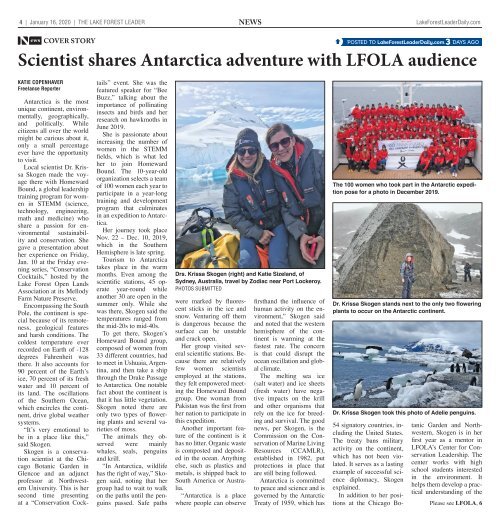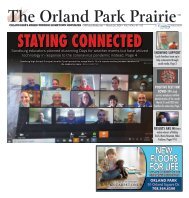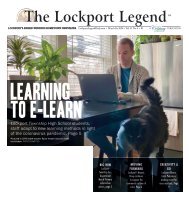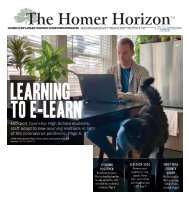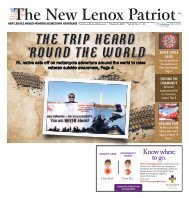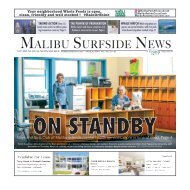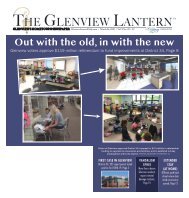LF_011620
LF_011620
LF_011620
You also want an ePaper? Increase the reach of your titles
YUMPU automatically turns print PDFs into web optimized ePapers that Google loves.
4 | January 16, 2020 | The lake forest leader NEWS<br />
LakeForestLeaderDaily.com<br />
Posted to LakeForestLeaderDaily.com 3 dayS ago<br />
Scientist shares Antarctica adventure with <strong>LF</strong>OLA audience<br />
Katie Copenhaver<br />
Freelance Reporter<br />
Antarctica is the most<br />
unique continent, environmentally,<br />
geographically,<br />
and politically. While<br />
citizens all over the world<br />
might be curious about it,<br />
only a small percentage<br />
ever have the opportunity<br />
to visit.<br />
Local scientist Dr. Krissa<br />
Skogen made the voyage<br />
there with Homeward<br />
Bound, a global leadership<br />
training program for women<br />
in STEMM (science,<br />
technology, engineering,<br />
math and medicine) who<br />
share a passion for environmental<br />
sustainability<br />
and conservation. She<br />
gave a presentation about<br />
her experience on Friday,<br />
Jan. 10 at the Friday evening<br />
series, “Conservation<br />
Cocktails,” hosted by the<br />
Lake Forest Open Lands<br />
Association at its Mellody<br />
Farm Nature Preserve.<br />
Encompassing the South<br />
Pole, the continent is special<br />
because of its remoteness,<br />
geological features<br />
and harsh conditions. The<br />
coldest temperature ever<br />
recorded on Earth of -128<br />
degrees Fahrenheit was<br />
there. It also accounts for<br />
90 percent of the Earth’s<br />
ice, 70 percent of its fresh<br />
water and 10 percent of<br />
its land. The oscillations<br />
of the Southern Ocean,<br />
which encircles the continent,<br />
drive global weather<br />
systems.<br />
“It’s very emotional to<br />
be in a place like this,”<br />
said Skogen.<br />
Skogen is a conservation<br />
scientist at the Chicago<br />
Botanic Garden in<br />
Glencoe and an adjunct<br />
professor at Northwestern<br />
University. This is her<br />
second time presenting<br />
at a “Conservation Cocktails”<br />
event. She was the<br />
featured speaker for “Bee<br />
Buzz,” talking about the<br />
importance of pollinating<br />
insects and birds and her<br />
research on hawkmoths in<br />
June 2019.<br />
She is passionate about<br />
increasing the number of<br />
women in the STEMM<br />
fields, which is what led<br />
her to join Homeward<br />
Bound. The 10-year-old<br />
organization selects a team<br />
of 100 women each year to<br />
participate in a year-long<br />
training and development<br />
program that culminates<br />
in an expedition to Antarctica.<br />
Her journey took place<br />
Nov. 22 – Dec. 10, 2019,<br />
which in the Southern<br />
Hemisphere is late spring.<br />
Tourism to Antarctica<br />
takes place in the warm<br />
months. Even among the<br />
scientific stations, 45 operate<br />
year-round while<br />
another 30 are open in the<br />
summer only. While she<br />
was there, Skogen said the<br />
temperatures ranged from<br />
the mid-20s to mid-40s.<br />
To get there, Skogen’s<br />
Homeward Bound group,<br />
composed of women from<br />
33 different countries, had<br />
to meet in Ushuaia, Argentina,<br />
and then take a ship<br />
through the Drake Passage<br />
to Antarctica. One notable<br />
fact about the continent is<br />
that it has little vegetation.<br />
Skogen noted there are<br />
only two types of flowering<br />
plants and several varieties<br />
of moss.<br />
The animals they observed<br />
were mainly<br />
whales, seals, penguins<br />
and krill.<br />
“In Antarctica, wildlife<br />
has the right of way,” Skogen<br />
said, noting that her<br />
group had to wait to walk<br />
on the paths until the penguins<br />
passed. Safe paths<br />
Drs. Krissa Skogen (right) and Katie Sizeland, of<br />
Sydney, Australia, travel by Zodiac near Port Lockeroy.<br />
Photos Submitted<br />
were marked by fluorescent<br />
sticks in the ice and<br />
snow. Venturing off them<br />
is dangerous because the<br />
surface can be unstable<br />
and crack open.<br />
Her group visited several<br />
scientific stations. Because<br />
there are relatively<br />
few women scientists<br />
employed at the stations,<br />
they felt empowered meeting<br />
the Homeward Bound<br />
group. One woman from<br />
Pakistan was the first from<br />
her nation to participate in<br />
this expedition.<br />
Another important feature<br />
of the continent is it<br />
has no litter. Organic waste<br />
is composted and deposited<br />
in the ocean. Anything<br />
else, such as plastics and<br />
metals, is shipped back to<br />
South America or Australia.<br />
“Antarctica is a place<br />
where people can observe<br />
firsthand the influence of<br />
human activity on the environment,”<br />
Skogen said<br />
and noted that the western<br />
hemisphere of the continent<br />
is warming at the<br />
fastest rate. The concern<br />
is that could disrupt the<br />
ocean oscillation and global<br />
climate.<br />
The melting sea ice<br />
(salt water) and ice sheets<br />
(fresh water) have negative<br />
impacts on the krill<br />
and other organisms that<br />
rely on the ice for breeding<br />
and survival. The good<br />
news, per Skogen, is the<br />
Commission on the Conservation<br />
of Marine Living<br />
Resources (CCAMLR),<br />
established in 1982, put<br />
protections in place that<br />
are still being followed.<br />
Antarctica is committed<br />
to peace and science and is<br />
governed by the Antarctic<br />
Treaty of 1959, which has<br />
The 100 women who took part in the Antarctic expedition<br />
pose for a photo in December 2019.<br />
Dr. Krissa Skogen stands next to the only two flowering<br />
plants to occur on the Antarctic continent.<br />
Dr. Krissa Skogen took this photo of Adelie penguins.<br />
54 signatory countries, including<br />
the United States.<br />
The treaty bans military<br />
activity on the continent,<br />
which has not been violated.<br />
It serves as a lasting<br />
example of successful science<br />
diplomacy, Skogen<br />
explained.<br />
In addition to her positions<br />
at the Chicago Botanic<br />
Garden and Northwestern,<br />
Skogen is in her<br />
first year as a mentor in<br />
<strong>LF</strong>OLA’s Center for Conservation<br />
Leadership. The<br />
center works with high<br />
school students interested<br />
in the environment. It<br />
helps them develop a practical<br />
understanding of the<br />
Please see <strong>LF</strong>OLA, 6


